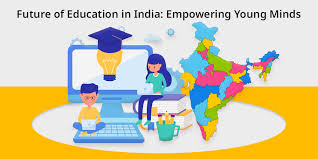🎓 Introduction
India’s education sector is undergoing a significant transformation in 2025, driven by technology, policy reforms, and a focus on skill development. The pandemic accelerated digital adoption, and today’s classrooms blend physical and virtual learning environments. This article explores the latest innovations, government initiatives, and challenges shaping education in India.
📱 Technological Innovations
- Widespread use of digital classrooms, virtual labs, and AI-powered personalized learning platforms.
- Integration of Augmented Reality (AR) and Virtual Reality (VR) in subjects like science and history.
- Growth of Massive Open Online Courses (MOOCs) and online certification programs.
- Increased adoption of smartphones and affordable internet in rural and remote areas enabling access.
🏛️ Key Education Reforms
- Implementation of the National Education Policy (NEP) 2020 continues to guide curriculum restructuring, multilingual education, and competency-based learning.
- Emphasis on skill development and vocational training to prepare youth for the job market.
- Expansion of higher education institutions and increased funding for research.
- Promoting inclusion of differently-abled and underprivileged children.
📚 Role of Private Sector and EdTech
- EdTech startups like BYJU’S, Unacademy, and Vedantu driving personalized and interactive learning experiences.
- Public-private partnerships increasing digital infrastructure and teacher training.
- Innovative models like hybrid schooling and community learning centers growing in popularity.
⚠️ Challenges
- Digital divide still prevalent, especially in tribal and rural regions.
- Quality and teacher-student ratio concerns in government schools.
- Balancing traditional teaching with emerging digital methods.
- Need for continuous teacher training and curriculum updates.
🔮 Future Outlook
- AI and analytics to further personalize education and identify learning gaps.
- Expansion of lifelong learning and upskilling programs for adults.
- Stronger focus on mental health and holistic education.
- Greater collaboration between industry and academia for job readiness.
🧠 Final Thought
India’s education landscape in 2025 is vibrant and evolving. With inclusive policies and innovative technology, the future of learning promises to be more accessible, engaging, and aligned with the demands of a digital economy.
































































